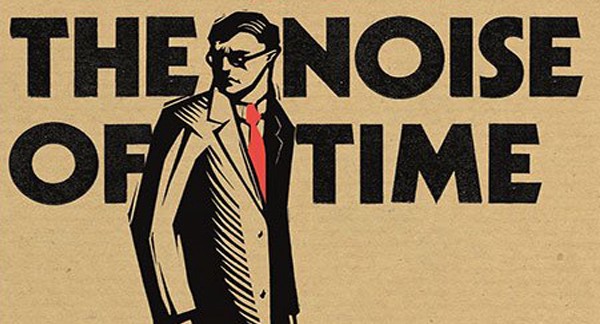Books & Culture
The Jittery Fearful Tone of Julian Barnes’ The Noise of Time

Night after night, Dmitri Shostakovich sits in the hall beside the elevator in his apartment building, fully dressed and chain smoking. He is waiting to be taken away by Stalin’s secret police and possibly tortured, possibly killed. He’s hoping to save his wife and daughter the trauma of watching him be dragged out of their home, and to save himself the indignity of being taken in his night shirt. If Stalin’s people get inside the apartment, he knows they will sack all his belongings ostensibly to find proof of his disloyalty, which they will find or plant as necessary. To isolate his bad luck and keep his family away from the state’s gaze as long as possible, he sits night after night waiting and smoking by the elevator. This is the scene that sets The Noise of Time, Julian Barnes’s new novel about the composer Shostakovich.
Barnes’s fiction typically has a swirling structure, with many small anecdotes and bits of thought or drama happening in and out of sequence, separated by white space on the page. He often uses phrases or ideas in a particular way then changes their significance several pages later. This style has never been better suited to his topic than here in The Noise of Time where the jittery fearful tone of the thoughts and the pointillist style work together seamlessly — a formal triumph for Barnes, while Shostakovich may be executed for artistic formalism. It’s not only that the prose style matches the anxiety of the character’s thoughts, Barnes has crafted something almost shockingly profound in this short book, pulling in a wide net of history, political theory, philosophy, feeling, art and plain human muddle into something both coherent and mysterious.
Shostakovich’s youthful thoughts about music are coherent and mysterious too — he knows exactly what he wants to write, and for whom, but there’s an invisible center to the difference between good art and bad art that he can’t ever define too concretely. The people who can define good art and its function too specifically are mocked musicologists or feared — Stalin — the face of what he calls “Power.”
Did he write, as his detractors maintained, for a bourgeois cosmopolitan elite? No. Did he write, as his detractors wanted him to, for the Donbas miner weary from his shift and in need of a soothing pick-me-up? No. He wrote music for everyone and no one. He wrote music for those who best appreciated the music he wrote, regardless of social origin. He wrote music for the ears that could hear. And he knew, therefore, that all true definitions of art are circular, and all untrue definitions of art ascribe to it a specific function.
Barnes can’t let this stand, though, and soon Shostakovich finds his certainties complicated —
It seemed such a brief while ago that they were all laughing at Professor Nikolayev’s definition of a musicologist. Imagine we are eating scrambled eggs, the Professor used to say. My cook, Pasha, has prepared them, and you and I are eating them. Along comes a man who has not prepared them and is not eating them, but he talks about them as if he knows everything about them — that is a musicologist.
But it did not seem so funny now they were shooting even musicologists.
He has failed to argue out of his certainties; he changes his mind slightly because musicologist shouldn’t be shot, and he doesn’t want to be shot himself. He doesn’t even fully change his mind, rather lets his opinions recede a little, and consider what he will do with his music if he doesn’t want to be killed. There’s something chilling and messy about the way circumstances change his mind, slightly wearing down what he thinks of as his integrity over and over.
How recently he had sensed within him youth’s indestructibility. More than that — its incorruptibility. And beyond that, beneath it all, a conviction of the rightness of whatever talent he had, and whatever music he had written. All this was not in any way undermined. It was just, now, completely irrelevant.
The relevant thing, as he’s trying not to be killed, is his love for his family and precious, fragile loyalty to his friends, which he knows will be easily destroyed by pain if they choose to torture him. He is in this situation because Stalin attended one of his operas, Lady Macbeth of Mtsensk, and sent Shostakovich to be interrogated for counterrevolutionary beliefs. The man who’s assigned the task of interrogating him is called Zakrevsky — on the day he is to go in for his interrogation, Zakrevsky is not available so Shostakovich goes home again, to wait for Power to come and take him some other way. He discovers that Zakrevsky is permanently not available — he has been killed by the same Power that had assigned him to kill Shostakovich. There could be another Zakrevsky in his place, though, someone else would do the job of torturing for information or just shooting him in the stairwell — unless Power had decided for some unplumbable reason to let Shostakovich live and go free. He is saved not by a counter-attack against his attackers, but by a muddle that may or may not be purposeful. He doesn’t know how long to wait for a substitute Zakrevsky to come for him, or if one ever will.
As he sits and smokes by the elevator, he thinks of the courtship between him and his wife — both believe in Free Love but settle into an unsteady monogamy after their daughter Galya is born. Again, the thing that half-defeats his principles of freedom isn’t directly relevant, it’s only a competing need, not a disproof. It only makes a mess of something that has seemed clear to him.
Did he still believe in Free Love? Perhaps so; theoretically; for the young, the adventurous, the carefree. But when children came along, you could not have both parents pursuing their own pleasure — not without causing unconscionable damage. He had known couples who were so set on their own sexual freedom that their children had ended up in orphanages.
That cost was far too high. So there had to be some accommodation. This was what lie consisted of, once you got past the part where everything smelt of carnation oil. For instance, one partner might practice Free Love while the other looked after the children. More often it was the man who took such freedom; but in some cases it was the woman. That was how his own case might look to someone from a distance, not knowing all the details. Such a spectator would see Nina Vasilievna away a lot, for work or pleasure, or both at the same time. She was not fitted for domesticity, Nita, neither by temperament nor habit.
One person could truly believe in the rights of another person — in their right to Free Love. But yes, between the principle and its implementation often lay some anguish. And so he had buried himself in his music, which took his entire attention and therefore consoled him. Though when he was present in his music he was inevitably absent from his children. And sometimes, it was true, he had had his own flirtations. More than flirtations. He had tried to do his best, which was all a man could do.
Eventually he gives up waiting to be killed in front of the elevator, and goes back to his ordinary life. The clarity of his fear diffuses through the book but he is never psychologically free. He never stops seeing the Power operating in his own life and the lives of others, even outside the Soviet Union when he travels to the U.S. and after Stalin’s death and he is coerced with awards rather than death threats. He is still, in some way, and always will be, in the stairwell waiting to be dragged off and shot in the back of his head.
Each morning, instead of prayer, he would recite to himself two poems by Evtushenko. One was “career” which described how lives are led beneath the shadow of Power:
In Galileo’s day, a fellow scientist
Was no more stupid than Galileo.
He was well aware that the Earth revolved,
But he also had a large family to feed.
None of Shostakovich’s goals or principles can stand uncorrupted — he’s not an exemplary husband or father even though he has sacrificed significantly for his family, and he is unsatisfied with his music and yet there is something in good music and in good love and even in Power that is clear and real despite it all. As the book spirals outward through Shostakovich’s life, his philosophical and artistic concerns are no longer simply about life and art in totalitarianism, but about life and art in the world. The great complexity of the book can sometimes feel like the mess of existence Shostakovich is continually experiencing, but the ending gives the book a startlingly crisp capstone, profound both in scope and in precision. Because it arises so organically from the rest of the book, I couldn’t give it away if I tried.









